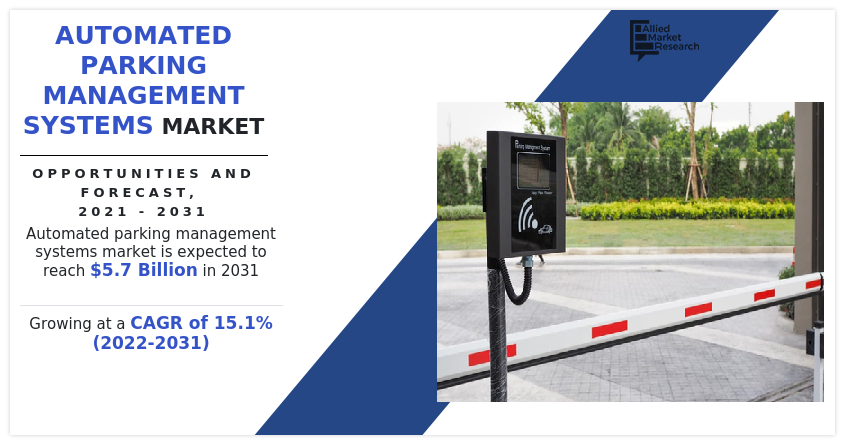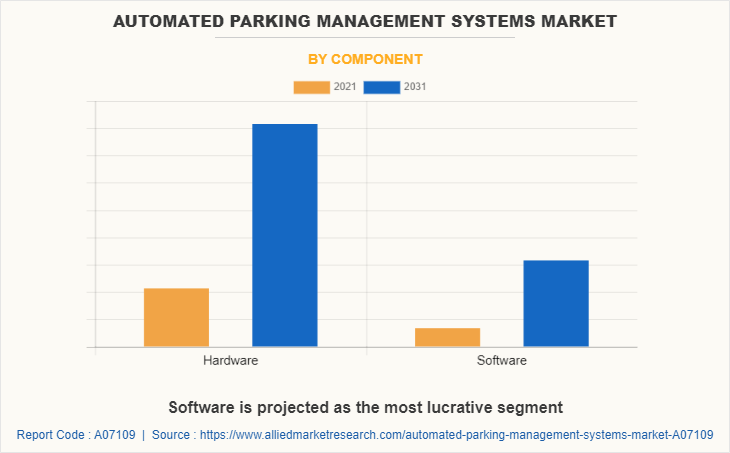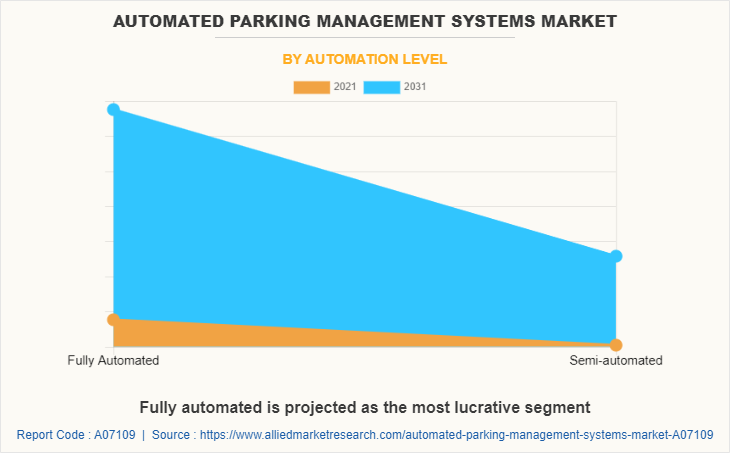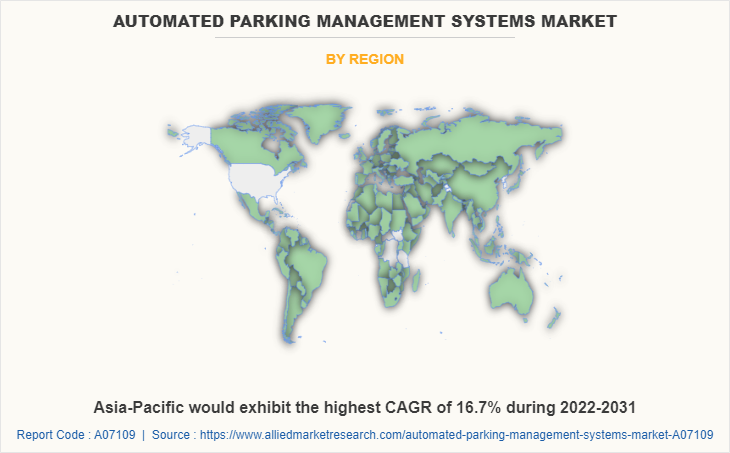The global automated parking management systems market was valued at $1.4 billion in 2021, and is projected to reach $5.7 billion by 2031, growing at a CAGR of 15.1% from 2022 to 2031.
Automated parking management systems comprises hardware and software components that assist in effective management of vehicle parking. It utilizes a mechanical system to transport vehicles to and from parking spaces in a multi-story parking area. Vehicles are stored in multiple parking lots, stacked vertically in a multi-story parking building or area. In addition, automated parking management systems can be either fully automated or semi-automated. Fully automated parking systems operate like robot valet parking, which in turn eliminates the need for parking attendants. Semi-automated parking systems require few actions by the attendant or the driver. Moreover, it has several advantages, such as enhanced parking, reduced congestion, reduced pollution, enhanced user experience, reduced operational & management costs, and improved safety.

The growth of the automated parking management systems market has propelled, due to rise in the number of vehicles globally, increase in demand for green parking solutions, and rise in urbanization. However, high initial investment is the factor hampering the growth of the market. Furthermore, initiative for smart cities is the factor expected to offer growth opportunities during the forecast period.
The automated parking management systems market is segmented on the basis of component, platform type, automation level, end-use, and region. By component, the market is segmented into hardware and software. By platform type, the market is fragmented into palleted and non-palleted. By automation level, the market is classified into fully automated and semi-automated. By end-use, the market is categorized into residential, commercial, and mixed-use. By region, the report is analyzed across North America, Europe, Asia-Pacific, and LAMEA.
Some leading companies profiled in the automated parking management systems market report comprises Amano Corporation, FATA Automation, Fehr Lagerlogistik AG (Skyline Parking), Flowbird, IBM Corporation, Klaus Multiparking GmbH, Robotic Parking Systems, Inc., Siemens AG, Skidata GmbH, Streetline, Inc., Swarco, T2 Systems, Unitronics (1989) (RG) Ltd, Westfalia Technologies Inc., and Xerox Corporation.

Rise in number of vehicles globally
COVID-19 impacted the automotive industry in a negative manner, resulting in decrease in vehicle production & decline in sales of automobiles. In addition, shortage of automotive components resulted in delays in production of vehicles across the globe. However, post-pandemic, the automotive industry witnessed growth in production & sale of automobiles all across the globe. Several automobile manufacturers have recorded growth in sales of vehicle over the years. Global car market grew by 4% in 2021 and global electric vehicle sales recorded a growth of 109% in 2021. In addition, in 2021, 79.1 million motor vehicles were produced across the globe, an increase of 1.3% as compared to 2020.
This production & sale of vehicles has increased the number of vehicles on the road, which in turn has resulted in creating several problems, such as limited parking places, traffic jams, and overcrowded cities. Rise in the number of vehicles in use across the globe has raised concerns about parking space issues for these vehicles. To address these issues, automated parking management systems have gained traction in major cities as the automated parking management systems can aid in parking a large quantity of vehicles efficiently in a small parking area. In addition, it also aids in reduction in fuel consumption and air pollution. Thus, rise in the number of vehicles globally is expected to drive the growth of the automated parking management systems market during the forecast period.
By Platform Type
Non-Palleted is projected as the most lucrative segment
Increase in demand for green parking solutions
Over the past couple of decades, mounting environmental concerns and efforts to minimize greenhouse emissions have led to the introduction of regulations regarding emission of greenhouse gases. Governments across the globe have formulated vehicular emission norms for checking the particulate emissions and to control automotive emissions. For instance, Corporate Average Fuel Economy (CAFÉ) standard formulated by the U.S., Euro emission standards formulated by European Union, and Japanese long-term emission standards are some of the existing emission standards being implemented. Hence, the focus of the automotive industry has shifted toward the development of environment-friendly solutions.
In addition, the time spent for finding parking space manually results in wastage of fuel, time and increased emission. As per the study conducted by Frost Sullivan, an average commuter spends about 80 hours yearly to find a parking space in Delhi. This time spent for spotting the parking space can be reduced with the aid of automated parking management system as it can park more vehicles in less space as compared to a traditional parking system. It also aids in reducing emission, fuel consumptions and carbon footprints. Moreover, solutions such as solar-based automated parking and parking spaces with electric vehicle charging points can aid in provide green parking solutions. Thus, increased demand for green parking solutions is the factor that drives the growth of the automated parking management systems market during the forecast period.
Rise in urbanization
With the rise in urbanization in several developing and developed nations globally, there is a surge in the number of vehicles in these nations, which in turn has resulted in scarcity of parking spaces. In addition, constrained by the limited land space in urban areas, it is difficult to resolve the parking problem solely by constructing more parking spaces. Therefore, need of smart parking solutions, such as automated parking management system arises.
Automated parking management systems reduce the width and depth required for a parking space. It also reduces the distance between vehicle parking spaces, as no allowance is required to be made for driving the vehicle into the parking space. Moreover, no driving lanes are required to drive the vehicle toward the parking space. Furthermore, no stairways or elevators are required to accommodate pedestrians in the parking area. Such advantages of automated parking management system are expected to aid in effective management of vehicles in urban areas, thereby eliminating the need to build large parking spaces. Thus, rise in urbanization is driving the growth of the automated parking management systems market.

High initial investment
The automated parking system is more efficient, time-saving, sustainable, and environment-friendly as compared to conventional parking system. These systems are efficient, maximize available space, and provide greater car safety.
These systems can also aid in the reduction of CO2 emissions and fuel consumption levels as they do not require the engine to be running while the car is moved about through the building. However, initial cost of constructing such type of automated parking management system is high. The construction of an automated parking management system is complex as it is built with the amalgamation of hardware and software components. Any fault in the hardware or software components can result in failure of the whole systems. Therefore, these systems are built using highly efficient machines and software, and increases the initial cost of constructing such type of parking systems. Thus, high initial investment restrains the growth of the automated parking management systems market.

The automated parking management systems market is segmented into Component, Platform Type, Automation Level and End-use.
Key Benefits For Stakeholders
- This report provides a quantitative analysis of the market segments, current trends, estimations, and dynamics of the automated parking management systems market analysis from 2021 to 2031 to identify the prevailing automated parking management systems market opportunities.
- The market research is offered along with information related to key drivers, restraints, and opportunities.
- Porter's five forces analysis highlights the potency of buyers and suppliers to enable stakeholders make profit-oriented business decisions and strengthen their supplier-buyer network.
- In-depth analysis of the automated parking management systems market segmentation assists to determine the prevailing market opportunities.
- Major countries in each region are mapped according to their revenue contribution to the global market.
- Market player positioning facilitates benchmarking and provides a clear understanding of the present position of the market players.
- The report includes the analysis of the regional as well as global automated parking management systems market trends, key players, market segments, application areas, and market growth strategies.
Automated Parking Management Systems Market Report Highlights
| Aspects | Details |
| By Component |
|
| By Platform Type |
|
| By Automation Level |
|
| By End-use |
|
| By Region |
|
| Key Market Players | T2 Systems, Amano Corporation, Xerox Corporation, Unitronics 1989 RG Ltd, Siemens AG, IBM Corporation, SWARCO AG, FATA Automation, Westfalia Technologies Inc., Fehr Lagerlogistik AG, Streetline, Inc., Robotic Parking Systems, Inc., Flowbird Group, SKIDATA GmbH, KLAUS Multiparking GmbH |
Analyst Review
The global automated parking management systems market is expected to witness significant growth owing to rise in the number of vehicles globally.
Automated parking management systems have gained traction in major cities as they aid in parking a large quantity of vehicles efficiently in a small parking area. In addition, it also aids in reduction in fuel consumption and air pollution. Thus, rise in the number of vehicles globally drives the growth of the market during the forecast period.
Governments of several countries have undertaken the initiative of smart cities, wherein advanced technologies are to be integrated with the city’s public infrastructure. The initiative of developing smart cities has resulted in the adoption of internet of things (IoT) technology to improve facilities, such as transportation, parking management, and mobility.
Among other things, smart city initiatives adopted by governments across the globe has created business opportunities for smart parking solutions, such as automated parking management system. Smart cities feature automated parking management systems, which are flexible, space-efficient, and easy to manage. For instance, in 2021, T2 Systems implemented T2Mobile Pay, a browser-based parking solution in Houston City Center. T2Mobile Pay enables visitors to pay for parking quickly and easily on their mobile phones.
The global automated parking management systems market was valued at $1,410.0 million in 2021 and is projected to reach $5,669.1 million in 2031, registering a CAGR of 15.1%.
The leading application is commercial.
The largest regional market is Europe.
The leading companies include Amano Corporation, FATA Automation, Fehr Lagerlogistik AG (Skyline Parking), Flowbird, IBM Corporation, Klaus Multiparking GmbH, Robotic Parking Systems, Inc., Siemens AG, Skidata GmbH, Streetline, Inc., Swarco, T2 Systems, Unitronics (1989) (RG) Ltd, Westfalia Technologies Inc., and Xerox Corporation.
The upcoming trends include development of fully automated parking solutions and greater penetration in residential areas.
Loading Table Of Content...


